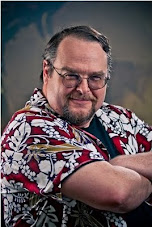Constellations is a quirky little love story set against the theory of multiple universes. It consists of a series of vignettes between beekeeper Roland (Max Gordon Moore) and cosmologist Marianne (Alexandra Tavares) on a bare stage. They meet at a mutual friend's barbecue. She flirts, he says he's involved. A bell sounds, they start again. She flirts, he says he's just broken up and isn't interested. Bell sounds, start again. She flirts and he responds, then mentions he's married. Bell sounds, start again.
It goes on like this as we move through the cute meet, the first date, the relationship, the breakup, the reuniting, the marriage, the diagnosis, the choices we make at the end of life. Starts and stops, alternate scenes in alternate universes where the characters are the same but not identical. A bell sounds, we start again. And it is a perilous path for a playwright to take and a challenge for the actors. The third time that Roland tries to use an explanation of bee society to a marriage proposal is funny, the sixth time we are deeply into Monte Python looking to wrap up an episode.
Moore and Tavares are very good in all this, but the play often feels like they are looking for the right line reading in rehearsal, trying the words on with various levels of engagement and intensity. Tavares in particular has the tougher time as she shifts convincingly into the ravages of her cancer and out again as the play messes not only with alternities but with time itself, foreshadowing with future scenes and leaping back to earlier temporal nodes. But ultimately, as the Lovely B noted, nothing here that Dr. Who has not addressed earlier and better.
(And yes, I am using British comparisons because it is set in Great Britain and everything sounds better in British. I wonder if the play would fly as well as it does if Roland and Mariane were Ronald and Mary Anne from Chicago.)
There are deep ideas rolling around in here beneath the surface, and the play gets marks for not calling them out to dance on the stage, but rather uses them quietly to power the action. The title, while not directly commented on, reflects part of the quandary of quantum physics - Constellations do not truly exist, except in the minds of those on Earth gathering stars into particular patterns. The observers are determining the nature of the universe. Time and free will exists because we determine it to be so. But while the play opens the doors for the curious, I don't thnk it delivers on them. A pair of ladies behind us read a summary of the play from the program book (loudly), and one declared, "Well, I read all that and I still don't know what its about". I fear the may still be in that boat at the play's conclusions.
In a season when the Rep has been knocking plays out of the park right and left with amazing accuracy, Constellations is a bunt, or maybe even a base on balls. It was OK, and probably would not disappoint in a normal year. But the Rep has gotten so good recently that it just feels like an average theater outing as opposed to must-see stagecraft.
More later,





